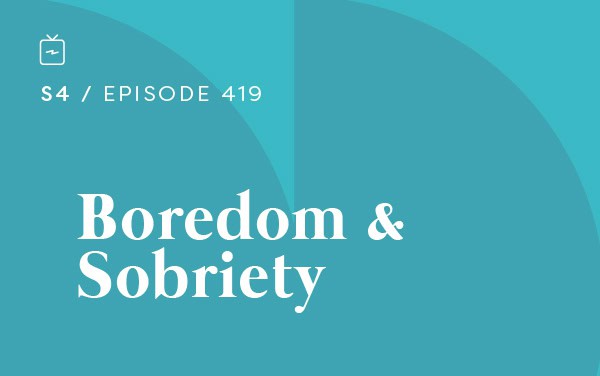
by Kris Oyen | Feb 27, 2023 | Podcast
Podcast: Play in new window | Download
Subscribe to the Recovery Elevator Podcast Apple Podcasts | | More
Episode 419 – Boredom and Sobriety
Today we have Joel. He is 42 from Lawton, OK, and took his last drink on November 28th, 2022.
Join Recovery Elevator in Atlanta, GA over Memorial Day weekend. Registration opens March 1st, and the Sunday evening event is for everyone, and you can find more information about it HERE!
Exact Nature: https://exactnature.com/RE20
[2:18] Highlights from Paul:
Boredom is a completely normal and natural emotion, one of the many all humans have. In today’s world, we are were unconsciously wired to feel inadequate if we are not stimulated 24/7. But boredom is healthy and what is needed for a creative spark.
Big alcohol has done a great job of convincing us that we cannot have fun without alcohol, and part of the sobriety process is finding joy or fun again – without the shit.
We can learn to leverage technology and maybe start researching something that we are interested in. And everything becomes a possibility when you quit drinking. It takes our body time to find a heathier homeostasis but with time and practice, boredom becomes the invitation for us to be open to whatever wants to come our way in an alcohol-free life.
Better Help: www.betterhelp.com/elevator – 10% off your first month. #sponsored
[12:01] Paul introduces Joel:
Joel has 51 days of sobriety at the time of this recording. He is manager of a large automotive retailer. He is married and they have a 14 year old daughter. He enjoys spending time outdoors hiking and at the lake.
Raised by a single mom and had addicts in his family. He didn’t really know his dad until he was 13-14 years old and doesn’t really have contact with him anymore. Parents had a toxic relationship.
Joel feels that this time in sobriety is different. He has tried many times and it seems like it gets harder every time. This time he feels that some of the signs he was given were different than before. He started realizing that he was allowing alcohol to take more and more control of his life. He was drinking on the way home from work, his wife hated his drinking so he was hiding it, and finally he realized it was becoming a huge problem. The last few weeks found him having some red flags that made him realize he really needed to stop.
Joel says the first few days were exciting and full of optimism and then about day 3-5 found him full of anxiety. He knew it was part of his healing, and found he needed to stay busy to keep sober. After two weeks he started feeling better, seeing some physical improvements and getting positive feedback from his wife. He feels very motivated to keep the momentum going and finally feels free.
He says he has always been a fan of routines, but now has a much healthier one without alcohol. Exercise has been a huge help to him as well as being reflective in a quiet space. As soon as he feels any anxiety he goes for walks regardless of where he is.
Thinking of the future Joel says he wants to be a role model for his daughter and live a happy life with his family. His mental health is important to him, and he has no interest in ever drinking again. Joel is in some sobriety groups and enjoys listening to podcasts. He and his wife also talk a lot about his journey, she is very understanding and supportive now.
Connect with Cafe RE Use the promo code OPPORTUNITY to waive the set-up fee.
Recovery Elevator YouTube
Sobriety Tracker iTunes
Recovery Elevator
Go big, because eventually we all go home.
I love you guys
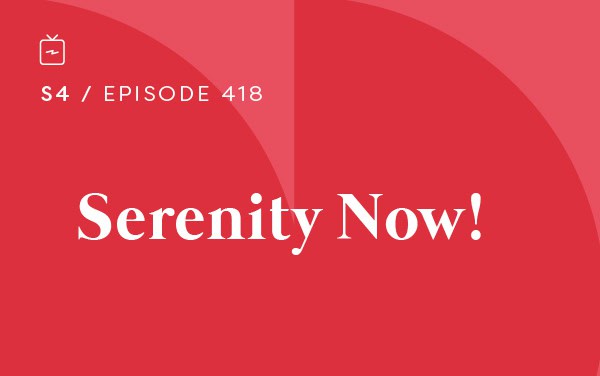
by Kris Oyen | Feb 20, 2023 | Podcast
Podcast: Play in new window | Download
Subscribe to the Recovery Elevator Podcast Apple Podcasts | | More
Episode 418 – Serenity Now!
Today we have Bethany. She is 34 from Michigan and took her last drink in January of 2021.
We have partnered with Sober Link. You can find some tips and can sign up for a $50 off promo code.
[2:15] Highlights from Kris:
Kris enjoys living in a small town where everyone helps one another, and the pace is rather consistent. He and his wife were recently on a trip to the city, and it was busier than usual which created sensory overload for Kris. He found himself in the candle section of Target taking a moment and saying the serenity prayer. It helps him shift his thinking that it’s all about him and reminds him that he can exist better with others.
God grant me the serenity to accept the things I cannot change
The courage to change the things I can
The wisdom to know the difference
It doesn’t fix everything right away, but it assists with pausing and choosing how to react going forward.
Better Help: www.betterhelp.com/elevator – 10% off your first month. #sponsored
[10:15] Kris introduces Bethany:
Bethany is 34, has two kids and a fiancé. She just graduated college last year, works as an account manager for a car parts company. For fun she likes to play video games and plays often with her fiancé. She also enjoys running, camping, travelling and quality time with friends and family.
Bethany wasn’t exposed to alcohol much growing up. She had her first drink when she was 14 and got sick so she didn’t try it again for a while. Started going to high school parties but didn’t drink when she was playing sports. She found herself in a toxic relationship with a boy she met in church. After a messy break up she stopped going to the church and ended up feeling the loss of community as a result. After going away to college, she started partying as a way to escape her depression.
By her sophomore year she stopped going to classes and for the next year, her drinking escalated a good bit more. She met her ex-husband around this time. She ended up getting pregnant and then they got married and had another child. She says they weren’t compatible, and they didn’t have a healthy relationship. Bethany feels she didn’t have a good real-life example of strong relationships growing up because her mom died when she was four and her dad never remarried. Her husband was in the military where the drinking culture is very normalized, and they drank a lot. Towards the end of the marriage, she realized that the drinking was getting in the way of her parenting, and it was hard to take any breaks from it. Everyone she was around drank like she did, so no one ever said anything to her about it. For a while she stayed stuck in the cycle of drinking too much, taking a few days off and then starting back again.
She met her fiancé at a friend’s party. He is a normal drinker and would sometimes call her out for her drinking. Bethany says her behavior towards him and others could be abusive, so she started trying to set rules around her drinking. It wasn’t until an incident that had her feeling bad about not being present for her kids prompted her to think about trying to quit drinking.
A Google search led her to finding RE and she discovered a few episodes that really resonated with her. For the first time she realized she wasn’t alone and felt hope for the future. She joined Café RE for support and accountability and started reading a lot of Quit Lit. Soon into recovery she found herself enjoying life without alcohol and enjoying her children playing sports. Her grades improved and she graduated with honors. She has started making friends that she enjoys spending time with.
[52:25] Kris’ Summary
Telling our stories is a brave thing and can help a lot of people. Reach out if you are interested in sharing your story: kris@recoveryelevator.com
Connect with Cafe RE Use the promo code OPPORTUNITY to waive the set-up fee.
Recovery Elevator YouTube
Sobriety Tracker iTunes
Recovery Elevator
The only way out is through, we can do this
I love you guys
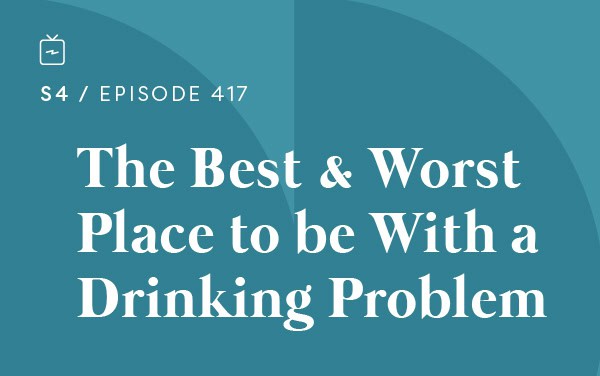
by Kris Oyen | Feb 13, 2023 | Podcast
Podcast: Play in new window | Download
Subscribe to the Recovery Elevator Podcast Apple Podcasts | | More
Episode 417 – The Best and Worst Place to be With a Drinking Problem
Today we have Jenny, she is 36 from Hudson, WI and took her last drink on 2/16/2020.
Shout out to our Café RE hosts! They do an amazing job.
If you are interested in joining, click the link and use the promo code OPPORTUNITY to wave the setup fee.
[02:45] Intro Summary:
When Paul describes the best and worst places to be with a drinking problem, they both look a lot alike.
That realization that alcohol no longer serves us, but we can’t imagine life without it can be a scary place to be. Alcohol has us right where it wants us. It may feel like part of you is dying, that feeling is grief.
But on the flip side, when we realize that alcohol no longer serves us, we can see that as an invitation to live the life we were meant to live. We are at the tipping point about to embark upon the greatest journey in our life.
We are all right where we need to be. Life will keep giving us the same lesson until we are ready to learn or make a change. By making that first jump into the unknown, you give others courage to do the same.
Better Help: www.betterhelp.com/elevator – 10% off your first month. #sponsored
[10:15] Paul introduces Jenny:
Jenny is 36 and lives in the small town of Hudson WI. She is married and they have one son together. She works in education and enjoys the outdoors – camping, backpacking, she also enjoys gardening, yoga and in recovery she learned that she likes to read.
Jenny’s drinking started when she was just 11 years old. A traumatic event that she didn’t share with anyone had her feeling alone and out of place. Jenny realized she loved drinking right from the start. She grew up aspiring to be the bad girl with the tough persona because it helped her put up a guard to protect herself. She enjoyed drinking and was willing to try any other drugs.
When she was 20 her and her boyfriend moved to Montana. She thought she could escape her issues, but that didn’t work. Her addictions got worse and while she would quit some things, the alcohol remained which helped her believe that she didn’t have a problem because drinking was socially acceptable.
At age 30, she lost a pregnancy and her drinking evolved from drinking for fun to being self-destructive. She later got pregnant again and her son was born 18 months later. She still struggled to quit drinking during pregnancy and since her doctor told her it was ok, she saw that as a green light to keep drinking.
When their son was 7 weeks old, they moved back home from Montana to their hometown to be close to family. In debt, postpartum with no job, the lived in her in-law’s basement and her drinking got really bad. No one called her out because drinking was all part of the culture.
Her turning point was after Super Bowl Sunday when she had crippling anxiety the day after and ended up staying in bed for two days with very dark thoughts. There is a history of suicide in her family and that is what stopped her from that path.
She says she was sober from alcohol for the first 14 months but doesn’t feel like she was in recovery. She ended up going to AA in April of 2021 and hasn’t looked back.
To her, there is a big difference between being sober and being in recovery. She is doing things that she likes to do instead of just not drinking. She feels like every day is a victory and she counts every day as it helps motivate her. At first, she had a hard time letting go of the old persona, but now she has let go of that and has redefined who she is. She loves mornings now and is doing well in her job. She also loves yoga and attends AA meetings frequently as well as other online community events.
Connect with Cafe RE – Use the promo code OPPORTUNITY to waive the set-up fee.
Recovery Elevator YouTube – Subscribe here!
Sobriety Tracker iTunes
Recovery Elevator
I love you guys
We can do this.
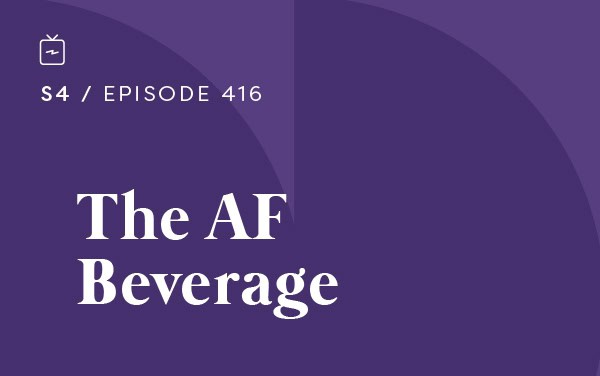
by Kris Oyen | Feb 6, 2023 | Podcast
Podcast: Play in new window | Download
Subscribe to the Recovery Elevator Podcast Apple Podcasts | | More
Episode 416 – The AF Beverage
Today we have Mike, he is 59 from Newport, OR and took his last drink on 1/27/2022.
Shout out to one of our sponsors – SoberLink – click the link for a promo code for RE listeners.
Our six week Sober Ukulele Course brought to you by Kala Brand ukulele starts this Saturday! There is still time to sign up. If you need a ukulele, use the promo code 23ELEVATOR for 15% off.
Thank you Café RE chat hosts! You do an amazing job!
[01:34] Highlights from Paul:
When quitting drinking, the thinking mind creates 99 problems or obstacles, but what to drink when we ditch the booze shouldn’t be one of them. Exploring AF beverages in recovery should be fun.
Paul gives us the three key pillars (the drink, the temperature, and the glass/cup) along with many great tips on combining these elements to make the perfect AF drink.
Better Help: www.betterhelp.com/elevator – 10% off your first month. #sponsored
[10:31] Kris introduces Mike:
Mike has been sober for 323 days at the time of recording. He lives on the Oregon coast and after leaving the restaurant business three years ago, he now manages a deli. He enjoys writing and walking on the beach which he lives very close to.
Mike started working in the restaurant business as a cook at the age of 15-16 years old. He says that alcohol comes with the restaurant industry. It was customary to drink with customer and coworkers, it was part of day to day life. No one really commented on his drinking because his family was on the west coast and he was attending college on the east coast. Everyone he associated with at the time drank as well.
He did some soul searching after he had gotten a divorce and took some time away from alcohol, but it was hard to sustain. The long hours and drinking we beginning to take a toll on him mentally and physically. He started making rules around his drinking but always broke them.
When he was 40, he got married again and they had a child. He says alcohol was a problem in his relationships and was starting to affect his job as well. He tried outpatient rehab and attending AA on his own but when that didn’t repair the marriage, he stopped going. His drinking increased and he got a few DUIs that included court ordered meetings and counseling. He was just checking the boxes by going, but ended up learning things on the way even though he wasn’t ready to quit drinking. He enjoys research and looks at that as time he used to research quitting drinking. He reflected on his journals that he has kept throughout his life and realized that he has always had issues with alcohol but didn’t listen.
He joined Café RE in September of 2021 after his girlfriend found Recovery Elevator and suggested it to Mike. He feels that quitting drinking this time is his choice which has made all the difference for him.
When Mike first started his current AF journey, he would keep track of any cravings that he would have in a notebook that he carried with him. He says by the time he finished writing it down the craving had mostly left. His friends know he has quit which has made socializing much easier. He enjoys AF beer and isn’t bothered by being around alcohol at events and when out playing pool.
Writing and processing his thoughts has been an instrumental tool for Mike in recovery. He works on his sobriety every single day and shares his reflections with the community daily since he quit.
[52:00] Kris’ outro:
Kris reflects on “sandpaper people”. This quote from the book Us by Terrence Real helped him change his responses and reactions to these types of people. Even subtle positive energy can have an impact on those around me.
“This world does not belong to us; we belong to on another”.
Connect with Cafe RE – Use the promo code OPPORTUNITY to waive the set-up fee.
Recovery Elevator YouTube – Subscribe here!
Sobriety Tracker iTunes
Thanks for being here RE and remember,
We’re the only ones that can do this, but we don’t have to do it alone.
I love you guys
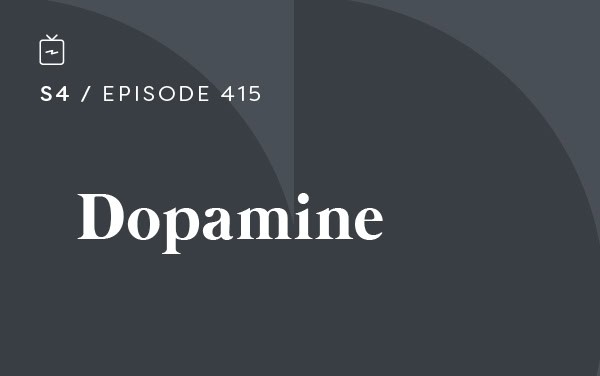
by Kris Oyen | Jan 30, 2023 | Podcast
Podcast: Play in new window | Download
Subscribe to the Recovery Elevator Podcast Apple Podcasts | | More
Episode 415 – Dopamine
Today we have Jorie, she is 31, from Westford, VT and took her last drink on 9/19/2020
There are two spots left for our next sober travel trip to Costa Rica from April 12th-21st for more information click the link Costa Rica 2023. The deadline to register is February 24th.
Registration is open for our 6 week Ukulele Course brought to you by Kala Brand ukulele – use the promo code 23ELEVATOR for 15% off. The course starts in three weeks on Saturday, February 11th so you have plenty of time to pick-up a ukulele.
[02:01] Highlights from Paul:
We hear a lot about dopamine in recovery. All humans have dopamine, but our dopamine systems all work differently. It is the chemical that drives us eat, find warmth, shelter, find a mate and is also known as the pleasure molecule.
Living in a world of abundance rather than scarcity finds us with an overwhelming number of dopamine-triggering stimuli for nearly all of us in one way or another. Many of us reached the point in our drinking where we no longer drank to feel good but drank just to feel normal. This is all tied to dopamine and how it is processed by the body. Dopamine is important to keep us going, but we must find healthier ways to get it.
Check out the book Dopamine Nation by Anna Lembke, it is a great read on the topic.
We have partnered with SoberLink – there is a promo code for RE listeners.
[09:14] introduces Jorie:
Jorie is 31 and was born in raised in Vermont. She enjoys running, playing hockey and loves to write which she says helps her stay in the present moment. She’s an athletic trainer at a local school, runs her own business and supervises sporting events. She is also part of a co-ed hockey league in her spare time.
Jorie didn’t start drinking until after college. Her parents divorced when she was young. Her father had a drinking problem, but her mother did not drink. She was never interested in drinking, she worked hard in school and played sports, so it didn’t fit into her lifestyle. She was in a long-term relationship since she was 18 and they got married when she was 27.
The pandemic really opened her eyes to her relationship with alcohol. She realized how uncomfortable it made her to think about alcohol not being an option to cope with things. Jorie and her brother challenged one another to quit drinking over the summer of 2020 and they almost made it three weeks. That experiment helped her to further review her drinking and she started realizing that she really tried to avoid being uncomfortable for a long time. She began reading books associated with recovery and discovered Recovery Elevator where she listened to other people’s stories and recognized that we don’t have to hit rock bottom to question our drinking.
When she quit drinking, she initially felt a lot of anxiety and fear. She felt guilt that she craved alcohol, she felt shame for listening to podcasts for hours. She wants to live her best life and realizes that alcohol will impede that. Jorie does not want to see a rock bottom and is focusing on her growth in sobriety. She feels stronger in her job and in her relationships and really thrives on focusing on the present.
For Jorie, recovery takes effort and continued learning is important.
[46:49] Paul’s outro:
In the book Dopamine Nation Dr Anna Lembke talks about a 30 day dopamine fast. It isn’t always that easy, but it is necessary to help us heal. Over time and with work, we can live a life without the temptations to the dopamine system.
Connect with Cafe RE – Use the promo code OPPORTUNITY to waive the set-up fee.
Recovery Elevator YouTube – Subscribe here!
Sobriety Tracker iTunes
Recovery Elevator
We took the elevator down, but we’ve got to take the stairs back up
I love you guys







